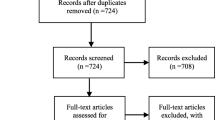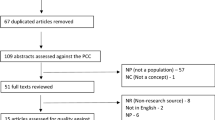Abstract
Nurses’ communication regarding the sexual health of women with gynecologic cancer is suboptimal and may be attributed to their lack of sexual health training and knowledge. Our study aims to document the learning experience, impacts, and feasibility of an online educational intervention activity between oncology nurses and a simulated participant on communication with patients regarding oncological sexual health. Using a qualitative approach, we conducted a feasibility study, which included 11 oncology nurses, and performed semi-structured individual interviews after our simulation exercise. We then conducted an iterative thematic data analysis. The participating nurses found the learning experience positive and satisfactory, despite issues with discussions between learners via Zoom™. Study nurse participants reported positive outcomes in knowledge, beliefs, attitudes, communication skills, and nursing practices. Finally, the educational intervention was found to be feasible. The online educational intervention involving a simulated participant appears to be a satisfactory, feasible, and promising module to improve communication regarding the sexual health of gynecologic cancer patients among oncology nurses. However, further studies are needed to verify this type of intervention’s effectiveness and optimize oncology nurses’ continuing education in sexual health.
Similar content being viewed by others
Data Availability
The data used to support the findings of this study are available from the corresponding author upon request.
References
Canadian Cancer Society (2018) Sex, intimacy and cancer. https://cancer.ca/en/cancer-information/resources/publications/sex-intimacy-and-cancer. Accessed 20 Jan 2021
Chapman CH, Heath G, Fairchild P, Berger MB, Wittmann D, Uppal S, Tolpadi A, Maturen K, Jolly S (2019) Gynecologic radiation oncology patients report unmet needs regarding sexual health communication with providers. J Cancer Res Clin Oncol 145:495–502. https://doi.org/10.1007/s00432-018-2813-3
Canadian Association for Nurses in Oncology (2020) Survivorship - full manual. https://www.cano-acio.ca/page/survivorship_manual. Accessed 17 Dec 2020
Reese JB, Sorice K, Beach MC, Porter LS, Tulsky JA, Daly MB, Lepore SJ (2017) Patient-provider communication about sexual concerns in cancer: a systematic review. J Cancer Surviv 11:175–188. https://doi.org/10.1007/s11764-016-0577-9
Fennell R, Grant B (2019) Discussing sexuality in health care: a systematic review. J Clin Nurs 28:3065–3076. https://doi.org/10.1111/jocn.14900
Papadopoulou C, Sime C, Rooney K, Kotronoulas G (2019) Sexual health care provision in cancer nursing care: a systematic review on the state of evidence and deriving international competencies chart for cancer nurses [Systematic Review]. Int J Nurs Stud 100:1–11. https://doi.org/10.1016/j.ijnurstu.2019.103405
Nestel D, Bearman M (2015) Simulated patient methodology: theory, evidence and practice. John Wiley & Sons
Peisachovich E, Da Silva C, Penhearow NJ, Sombilon EV, Koh M (2020) Implementing virtual simulated person methodology to support the shift to online learning: technical report. Cureus 12:1–13. https://doi.org/10.7759/cureus.8864
Polit DF, Beck CT (2021) Nursing research: generating and assessing evidence for nursing practice (11th edn). Wolters Kluwer
Creswell JW (2014) Qualitative, quantitative and mixed methods approaches (4th Ed.). Sage Publications, Inc
Jeffries PR (2012) Simulation in nursing education: from conceptualization to evaluation (2nd edn). National League for Nursing
Centre de simulation de la faculté des sciences infirmières de l'Université de Montréal. s.d. Guide de développement de la simulation clinique de haut réalisme. Faculté des sciences infirmières de l'Université de Montréal
Annon JS (1976) Behavioral treatment of sexual problems: brief therapy. Harper & Row
Hoffmann TC, Glasziou PP, Boutron I, Milne R, Perera R, Moher D, Altman DG, Barbour V, Macdonald H, Johnston M, Lamb SE, Dixon-Woods M, McCulloch P, Wyatt JC, Chan AW, Michie S (2014) Better reporting of interventions: template for intervention description and replication (TIDieR) checklist and guide. BMJ 348:1–12. https://doi.org/10.1136/bmj.g1687
Canadian Association of Nurses in Oncology (2006) Practice standards and competencies for the specialized oncology nurse. Canadian Association of Nurses in Oncology
Sidani S, Braden CJ (2011) Design, evaluation, and translation of nursing interventions (1st edn). John Wiley & Sons
Miles MB, Huberman AM, Saldana J (2019) Qualitative data analysis: a methods sourcebook (5th edn). Sage Publication
Mrad H, Vinette B, Chouinard A, Bilodeau K (2022) Educational interventions to improve communication about sexual health between nurses and gynecologic oncology patients: a narrative review. Can Oncol Nurs J Revue canadienne de nursing oncologique 32:30–37. https://doi.org/10.5737/236880763213037
Naismith LM, Kowalski C, Soklaridis S, Kelly A, Walsh CM (2020) Participant perspectives on the contributions of physical, psychological, and sociological fidelity to learning in interprofessional mental health simulation. Simul Healthc 15:141–146. https://doi.org/10.1097/sih.0000000000000425
Cheng A, Kolbe M, Grant V, Eller S, Hales R, Symon B, Griswold S, Eppich W (2020) A practical guide to virtual debriefings: communities of inquiry perspective. Adv Simul 5:1–8. https://doi.org/10.1186/s41077-020-00141-1
Turner S, Harder N (2018) Psychological safe environment: a concept analysis. Clin Simul Nurs 18:47–55. https://doi.org/10.1016/j.ecns.2018.02.004
Rogers B, Baker KA, Franklin AE (2020) Learning outcomes of the observer role in nursing simulation: a scoping review. Clin Simul Nurs 49:81–89. https://doi.org/10.1016/j.ecns.2020.06.003
Jonsdottir JI, Zoëga S, Saevarsdottir T, Sverrisdottir A, Thorsdottir T, Einarsson GV, Gunnarsdottir S, Fridriksdottir N (2016) Changes in attitudes, practices and barriers among oncology health care professionals regarding sexual health care: outcomes from a 2-year educational intervention at a university hospital. Eur J Oncol Nurs 21:24–30. https://doi.org/10.1016/j.ejon.2015.12.004
Regmi K, Jones L (2020) A systematic review of the factors - enablers and barriers - affecting e-learning in health sciences education. BMC Med Educ 20:1–18. https://doi.org/10.1186/s12909-020-02007-6
Beckett H (2020) Effect of e-learning on nurses’ continuing professional development. Nurs Manage 27:16–22. https://doi.org/10.7748/nm.2020.e1899
Acknowledgements
The authors would like to thank the study participants and Audrey Morel, simulation program development advisor at the Direction de of Education and Academy at the University of Montreal Health Centre.
Funding
This study was developed and conducted as part of the master program of the first author and for which she received scholarships from the following: the Ministère de l’Éducation et de l’Enseignement supérieur‑Université (QC, Canada), the Quebec Network on Nursing Intervention Research (QC, Canada).
Author information
Authors and Affiliations
Contributions
All authors contributed to the study conception and design. Material preparation, data collection, and analysis were performed by Hazar Mrad and Karine Bilodeau. The first draft of the manuscript was written by Hazar Mrad and Karine Bilodeau and all authors commented on previous versions of the manuscript. All authors read and approved the final manuscript.
Corresponding author
Ethics declarations
Ethics Approval
This study was performed in line with the principles of the Declaration of Helsinki. Approval was granted by the Ethics Committee of the Research Center of the Montreal University Hospital Center, QC, Canada.
Consent to Participate
Informed consent was obtained from all individual participants included in the study.
Conflict of Interest
The authors declare no competing interests.
Additional information
Publisher's Note
Springer Nature remains neutral with regard to jurisdictional claims in published maps and institutional affiliations.
Rights and permissions
Springer Nature or its licensor (e.g. a society or other partner) holds exclusive rights to this article under a publishing agreement with the author(s) or other rightsholder(s); author self-archiving of the accepted manuscript version of this article is solely governed by the terms of such publishing agreement and applicable law.
About this article
Cite this article
Mrad, H., Chouinard, A., Pichette, R. et al. Feasibility and Impact of an Online Simulation Focusing on Nursing Communication About Sexual Health in Gynecologic Oncology. J Canc Educ 39, 3–11 (2024). https://doi.org/10.1007/s13187-023-02366-w
Accepted:
Published:
Issue Date:
DOI: https://doi.org/10.1007/s13187-023-02366-w




